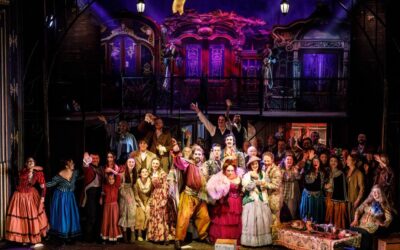By Jennifer Beasley
Mayhem. Murder. Madness.
These are the tenets of Shakespeare’s Macbeth. Presented by MUST (Monash University Student Theatre) at The Alexander Theatre located at Monash University, this bold production snaps open with a silent slow-motion fight scene between Macbeth (John Burgess) and other opponents. Spotlights add a baroque tone, and then. Then we see the witches. The three weird sisters, standing sentinel under blue lights. Watching.
Credit here to the Director, Yvonne Virsik, who, with over a hundred productions under her name, masterfully directs the twenty-three cast members to engage the audience as often as possible (which is needed with a play running at two hours and twenty minutes, including the interval). Although this is a traditional retelling of this five-hundred-year-old play, Virsik has kept it current with lighting (Ryan Mangold), Dramaturgy (Sacha Acland) and what I thought as a marvellously spooky set adorned only with the ragged curtains and engaging fight choreography by Callum Dale.
John Burgess does his best to delve into the power and madness of Macbeth, however, he fails to truly communicate the subtle tyranny in the first act. This was most notable in ‘Is this a dagger?’ soliloquy, where Macbeth’s guilt and growing insanity are all delivered with the same blandness. Thankfully he lifts his game in Act Two, delivering a stronger performance. Good support supplied by Jonathan Best as Banquo, the friend Macbeth ultimately betrays. His ghostly presence (no spoiler really considering the fame of the play) is both unhinged in its silence and creepy to boot. The way he glides/walks serves only to frighten Macbeth further. Good make-up adds to his deathly appearance.
With the help of atmospheric sounds supplied by, Alex Aidt, Sofia Jorgovic and the two assistants, Jane Pekin and Hadar Flenner, and flowing scene changes, there are no dead spots in this production (yes, pun intended). The story unfolds as Macbeth’s ambition is supped as the three weird sisters feed a self-fulfilling prophecy to him.
And then.
Then in comes Lady Macbeth. Elena Ruefenacht rules the stage. She blazes in her maroon dress, set curtains drenched in blood-red light. She is the goader, the schemer, yet fragile and loved by her equally scheming husband. Ruefenacht channels Lady Macbeth. She IS Lady Macbeth and inhabits the prose in a way that transports the audience onto the stage. I wasn’t listening to iambic pentameter, I was listening to emotive language emitted with all the power of conviction, passion and fear of an incredible performance. From Ruefenacht’s clever use of stage space (great direction), naturistic style and even the odd comic moment, her Lady Macbeth lifts this production, both inspiring and supporting the other characters.
With such a strong leading performance it was lovely to see the comic foil of the Night Porter, played by a sparkling Kieran O’Baoill, lend some lightness against the tragedy. A solid performance also from Patrick Leong as Macduff, who came into his own in Act Two, and good voice work from Jack Lees as Duncan. He has this beautiful timbre and deep resonance, which leant a commanding aura of respect as the king. In writing this review I am aware that all of the cast are students, and I am in awe of their dedication to this performance, as well as to their continuing studies. Praise to Fergus McLaren as Ross, again he showed a stronger projection of his character in Act Two, and Max Pickering as Malcolm, who seemed to struggle with some of the intent of the prose yet delivered excellent facial mobility. I also enjoyed Nethuli Bandara’s nervous chatter as Lennox in Act Two.
More finesse could have been put into the costuming, something to denote the nobility better, although in keeping with the tone of the play, blacks and greys served as a backdrop to blood and madness. The final battle sequence with black quilted over pieces distinguish this scene and with so many actors, not an easy task for Marni McCubbin, Kirra O’Keefe and their two assistants. One other mention with the battle piece. I loved the dramatic input of the row of spotlights, the actors marching out in two lines, and then their footsteps ringing along with the bell, tolling something wicked, something coming.
Now. The witches.
These three witches (you thought I’d forgotten, didn’t you?). Felicity Barrow (First Witch), Tiara Pires (Second Witch) and Jasmine Salter (Third Witch) embody weirdness. So creepy. From that first watchful opening in Act One, to the hackle-raising-spine-tingling beginning in Act Two, these three individuals weave their magic, spinning trochaic tetrameter as their spell, frayed ropes around their wrists and ankles binds them to madness, greed and forces unseen. In a blink of an eye, they seem to merge into one. The First Witch points, Macbeth powerless to look away. The Second Witch channels a spirit, who speaks of forests that move and attack. The Third Witch, equally possessed (and with a manic gleam to her eyes), foretells that Macbeth will never be killed by one born of woman. Then they vanish, leaving Macbeth to fulfill his doom.
This is a solid retelling of Macbeth with some standout performances. Well worth the viewing and I attended to a nearly full five-hundred seat theatre. Held at the Alexander Theatre in Clayton, Macbeth runs until 28th September.
Image: Eric Stone





